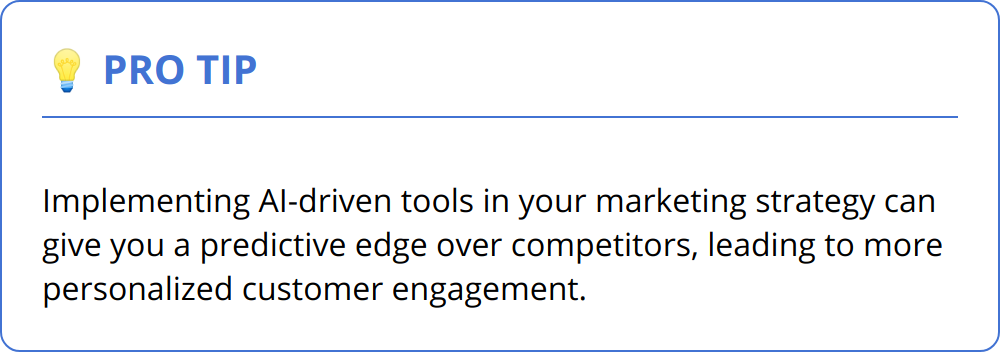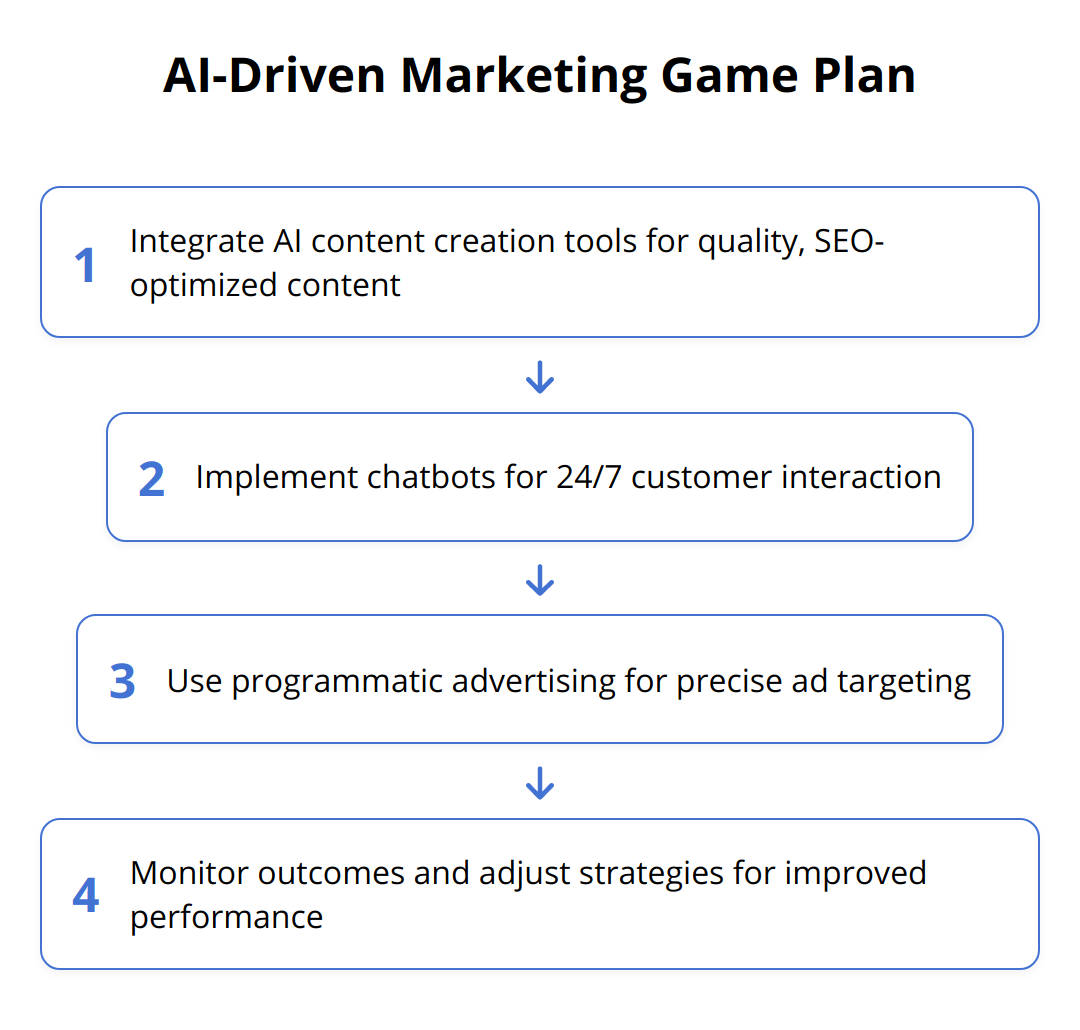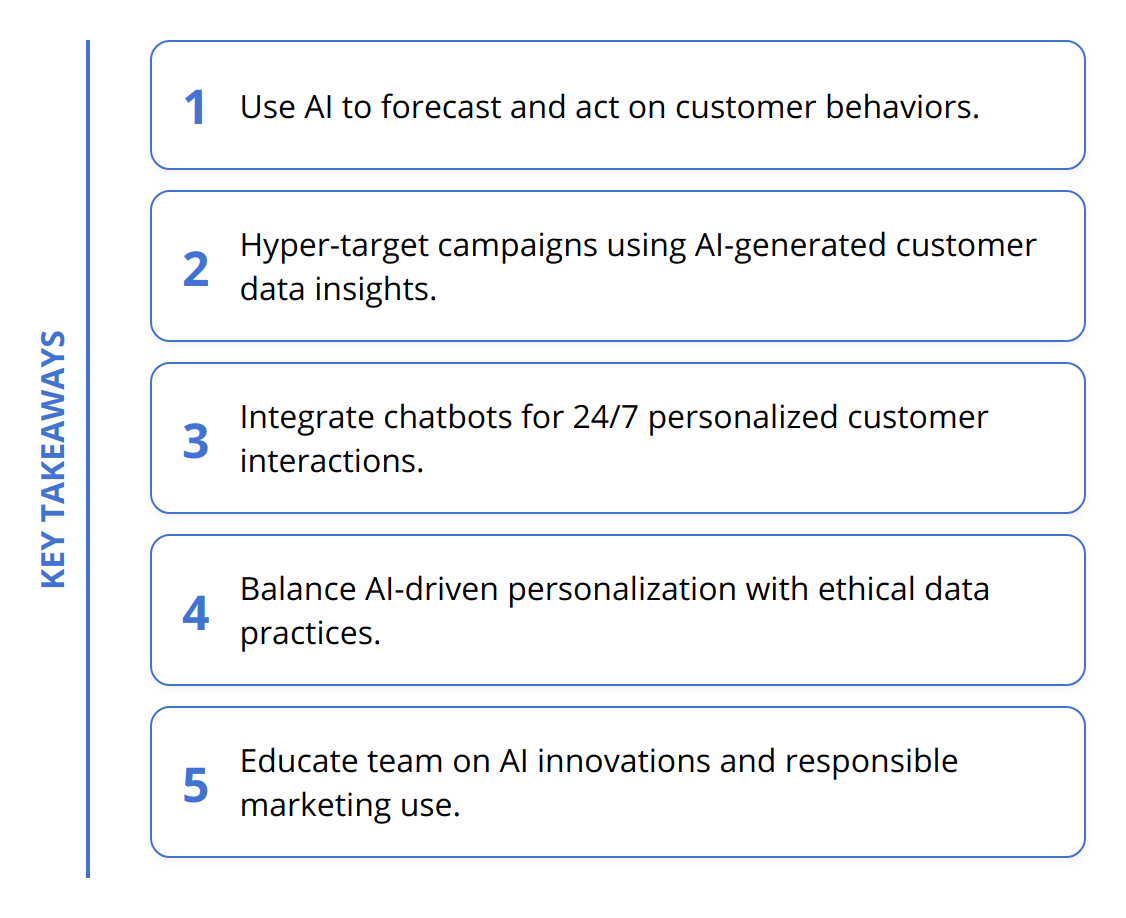We at Emplibot believe that integrating AI into your marketing strategy can be a game-changer. Marketers who harness the power of AI are finding new ways to understand and engage with their customers.
From personalized experiences to streamlined operations, the benefits are tangible and measurable. Let’s explore practical AI marketing tips that can give you a competitive edge.
Boosting Customer Insights Through AI
The landscape of consumer behavior is constantly shifting, but AI gives marketers an exceptional ability to stay ahead. If you’re not already making data your co-pilot in carving out customer insights, you’re missing out on a treasure trove of strategic advantage.
Predictive analytics is not just flashy tech talk; it’s the ace in your marketing sleeve. It provides forecasts based on historical data, but here’s where it gets exciting — it helps anticipate what your customers will need next. With these predictions, crafting tailor-made solutions isn’t just possible; it’s a reality. Take Netflix’s recommendation engine, for example. By analyzing watching habits, Netflix doesn’t just cater to current desires — they prime their audience for what they’ll crave next.

But perhaps you’re wondering, “How do I bring this home to my marketing efforts?” The answer lies in gathering and dissecting customer data. This step is pivotal, not just to throw around big numbers but to fine-tune your targeting strategy. Pinpoint where your customers hang out online, what they interact with, and you’ll deliver campaigns that resonate deeply. In a swirl of content, personalized targeting makes your message the north star that guides customers back.
Got a solid social presence? Great! But it’s time to move beyond counting likes and retweets. Scouring social media sentiment consistently is your window into brand health. Monitoring platforms reveal how people really feel about your brand, giving you immediate flags for concerns and opportunities to celebrate wins.
Here’s a tangible action plan:
-
Implement AI-driven predictive analytics tools to forecast customer behaviors.
-
Use data analytics to hyper-target your marketing campaigns.
-
Monitor social media sentiment rigorously to gauge public perception.

Through these steps, notice how your marketing doesn’t just send messages into the void — it starts conversations that matter. With AI, your campaigns wear the hat of intuition and speak to the heart of your customers’ needs, often before they can even articulate them themselves. That’s more than marketing; that’s building a relationship. And in the marketing cosmos, strong relationships are your bedrock for undoubted growth.
How Does AI Personalize Experience?
Gone are the days of one-size-fits-all marketing. Now it’s about giving each customer an experience that feels tailor-made. With AI, personalization is not just efficient but also sophisticated and, truth be told, expected by consumers. Achieving this may seem daunting, but with the right approach, it’s absolutely doable.
Firstly, individualizing content recommendations is a powerful way to keep customers engaged. This is where analyzing past interactions comes into play. By tracking what a user reads, watches, or purchases, you can leverage AI to suggest similar or complementary items. It’s the strategy behind the success of companies like Spotify, which translates listening habits into new musical discoveries for its users. They also prominently feature AI-driven playlists like “Discover Weekly,” a prime example of successful content personalization.

Moving to products, AI takes your customer’s digital footprint – clicks, views, cart additions – to sculpt immaculately tailored product suggestions. Imagine the surprise and delight when customers find exactly what they were looking for, or even what they didn’t know they wanted, presented to them at just the right moment. Amazon’s “Frequently bought together” recommendations are a testament to the power of AI in enhancing the shopping experience through personalized suggestions.

Automating personalization across multiple channels is where scale meets intimacy. Whether it’s through email campaigns, social media, or your own website, AI ensures a unified and personalized customer journey. Take for instance the way automated email campaigns can address customers by name, recommend products based on past purchases, or send cart abandonment reminders. This strategy not only increases the likelihood of conversion but also strengthens the customer’s engagement with the brand.
These guiding principles for personalization will redefine your customer’s experience:
-
Analyze interaction data to inform content and product suggestions.
-
Employ AI for real-time personalization across all customer touchpoints.
-
Ensure consistency in personalization to solidify customer relationships.
When you pair these techniques with the power of AI, you shift from selling products to offering experiences. Personalization at such a nuanced level taps into customer loyalty and transforms it into a long-lasting bond. This is the heart of modern marketing: an experience so personal, it feels like it was crafted just for them.
Enhancing Marketing with AI Tools
When it comes to taking your marketing strategy from good to great, it’s about using the best tools for the job. AI has a toolbox that’s brimming with options to streamline your efforts and amplify your impact. Let’s not beat around the bush: success in today’s digital marketing landscape requires leveraging AI tools effectively.
Content creation, once a daunting task, is now revolutionized with AI assistance. Tools like Jasper AI or Surfer SEO are transforming how we produce content that’s not only rich in quality but also SEO-friendly. These platforms serve as your own digital writing assistant, suggesting improvements to make your content more readable and engaging. They save hours of work by assisting with research and generating drafts based on your input, ensuring you scale content without a dip in standards.
Next, let’s talk about customer service; this is where chatbots shine. Companies adopting AI-powered chatbots witness improved customer engagement and support. As per reports, businesses using chatbots for customer service saw a customer satisfaction increase by 24%. Instantaneous and accurate, chatbots like those powered by Google’s Dialogflow enable real conversations with customers 24/7, addressing their queries and guiding their journey, ultimately driving up engagement and conversions.
Programmatic advertising platforms are another standout in the AI toolset. Using AI to handle real-time bidding on ad inventory, these platforms allow for the optimization of ad expenditure and targeting precision. In fact, well-implemented programmatic advertising can lead to a 20% increase in conversion rates. Your ads become more than just a shot in the dark; they’re targeted arrows hitting the bull’s-eye of customer interest and intent.
Here’s your practical game plan for leveraging AI in your marketing:
-
Integrate AI content creation tools to maintain high-quality, SEO-optimized content production.
-
Implement chatbots for around-the-clock, personalized customer interaction.
-
Use programmatic advertising platforms to ensure your advertising dollars are spent targeting the right eyes at the right time.

By adopting these AI tools, you ensure that every element of your marketing is working not just harder, but smarter. The machine intelligence works in tandem with human creativity to bring about results that were once thought unattainable. Think of it this way: AI doesn’t take the artist away from marketing; it provides them with a wider palette and a more precise brush.
Remember, adopting these tools isn’t just about keeping up; it’s about leading the charge. With AI, the potential for growth is not merely incremental; it’s exponential. Know that after you implement these tools, you’ll look back and wonder how you ever managed without them. And just as you’ve fine-tuned your strategy using these tips, stay alert for the next wave of innovation in marketing that will take the potential for engagement and conversion even further.
Navigating AI Ethics in Marketing
As we move into an era where voice search and voice-activated devices are becoming commonplace, ethical marketing has surfaced as an essential pillar in any company’s strategy. It’s no longer sufficient to be solely results-driven; the methods to achieve those results are under scrutiny too. Brands need to balance the innovative capabilities of AI with moral responsibility, ensuring transparency and trust with their consumers. This crucial intersection between innovation and ethics defines your brand’s future in the AI landscape.
Voice search is on the rise, and smart marketers are already optimizing their content for spoken queries. But success isn’t just about adapting to this technical shift; it’s about respecting user privacy in doing so. Ethical use of AI means gathering voice data responsibly, making sure it’s secure, and obtaining explicit consent where required. This approach not only complies with data protection regulations but also builds trust—a currency growing in value daily.
At the same time, ethical considerations should shape our marketing strategies. AI’s potential to micro-target can be a double-edged sword. On one hand, it enables creating highly personalized campaigns. On the other, it raises concerns about intrusiveness. Striking a balance is key, and it boils down to one word: respect. Respect for privacy, respect for consent, and respect for the individual’s choice to be forgotten. Companies tackling these issues head-on are the ones garnering long-term customer loyalty.
To thrive in the AI-driven landscape, continuous learning is mandatory. AI is not a set-it-and-forget-it tool; it needs guidance. As marketers, prioritize staying informed about AI trends and developments. Engage with the latest AI advancements to stay competitive but do so ethically. Engage with the legal frameworks governing AI use. This is necessary for major industries where AI decisions can have significant consequences.
The adaptable nature of AI means that marketing strategies must evolve with the technology. Automation tools are becoming smarter and more intuitive, but they reflect the goals and values set by their human operators. Set clear policies within your organization for the ethical use of AI. Ensure the entire team understands the boundaries and the commitment to use these powerful tools responsibly.
Here are actionable insights for marketers navigating AI ethics:
-
Prioritize user consent and data security for voice search optimization.
-
Balance personalization and privacy to retain consumer trust.
-
Continuously educate your team on responsible AI use in marketing.
Companies that take the ethical high road with AI provide not just better experiences for their customers, but set themselves up as brands of the future—ones that consumers can trust and rely on. Marketing is a powerful force, and wielding AI within ethical bounds provides a win-win: it’s not only more effective long-term but also reinforces your brand’s integrity in a tech-driven world.
Final Thoughts
The integration of AI in marketing has transformed how we understand and connect with customers. Throughout this post, we’ve illuminated the depth and breadth of AI’s capabilities, from forecasting customer behaviors to delivering hyper-personalized experiences. And with tools to automate and enhance every facet of digital marketing, businesses are positioned to meet their customers with unprecedented precision. Here, we capture the essence of what we’ve discussed to help consolidate your knowledge and propel future strategizing.

Integrating AI into marketing isn’t just about adopting technology; it’s about embedding intelligence into the heart of your strategy. The ability to predict customer needs, craft dynamic and individualized content, and operate with real-time responsiveness, fundamentally shifts the marketing landscape. Whether through insightful analytics, bespoke customer journeys, or streamlined content creation, AI’s role in marketing continues to expand and refine.
But with great power comes great responsibility. The move towards AI-driven marketing demands a balance between technological innovation and strict adherence to ethical standards. Remember, marketing is about building trust as much as it is about driving sales. Here is where the narrative of your brand aligns with the values of your customer, creating a synergy that not only enhances engagement but strengthens loyalty.
For businesses ready to tap into the potential of AI in elevating their marketing, remaining grounded in ethics is as important as pursuing innovation. Here are key takeaways for marketers:
-
AI excels in transforming data into actionable insights.
-
Personalization is crucial; AI tailors experiences to customer preferences.
-
AI tools, such as those for content creation, chat, and advertising, optimize marketing tasks.
-
Ethical use of AI ensures brand trust and aligns with customer expectations.
As we look to the future, innovation in AI marketing remains imperative, yet it must go hand-in-hand with responsible practices. The challenge is to weave AI technology throughout your marketing efforts while ensuring transparency and respect for consumer privacy. This dual approach isn’t just recommended; in the eyes of your customers, it’s expected.
So, as you lay the groundwork for a smarter, more adaptive marketing paradigm, consider harnessing the automatic content creation capabilities we offer at Emplibot. We publish SEO-friendly articles on your WordPress site entirely automatically, blending keyword optimization, relevant images, and strategic internal linking into your content strategy – a critical component in the AI marketing realm.
Stay on the pulse of innovation, push the envelope responsibly, and watch as AI not only refines your marketing but redefines the relationships you have with your customers. Ready to take your content strategy up a notch with AI-fueled precision? Explore our offerings and see how Emplibot can fortify your digital presence one automated, intelligent post at a time.

